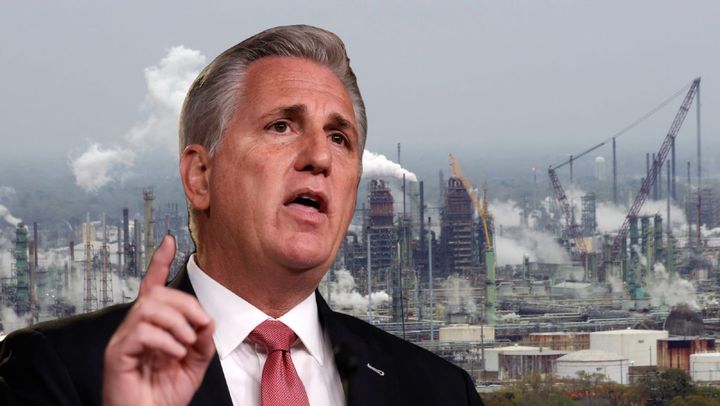House Republicans demonstrated their support for the fossil fuel industry today by passing a package of legislation to weaken environmental protections and increase drilling on public lands that they have deemed H.R. 1, a symbolic bill number that is typically reserved for the top legislative priority of the party in control in each congressional session.
The House vote, 225 to 204, came after House Republicans’ campaign efforts received a large sum of cash from donors in the fossil fuel industry, which is now strongly cheering the bill. The Congressional Leadership Fund (CLF), the highest-spending super PAC backing House Republicans that is endorsed by House Speaker Kevin McCarthy, received at least $27 million during the 2022 election cycle from donors in the fossil fuel industry, according to a Sludge review of Federal Election Commission data—a threefold increase over the amount of fossil fuel money it received during the previous cycle.
The sweeping H.R. 1 package, titled the Lower Energy Costs Act, combines bills introduced by dozens of Republicans and is sponsored by some of the House members who received the most in oil & gas industry donations last cycle, including Majority Leader Steve Scalise, with co-sponsorship from Committee on Energy and Commerce Chair Cathy McMorris Rodgers (Wash.), Committee on Natural Resources Chairman Bruce Westerman (Ark.), and Committee on Transportation and Infrastructure Chairman Sam Graves (Mo.). The GOP took control of the House in the midterm elections with a net gain of nine seats. At a time when big oil companies were banking record profits, many Republicans argued during their campaigns that government regulations were responsible for high gas prices.
While President Joe Biden has promised to veto the bill, and it is opposed by Senate Majority Leader Chuck Schumer, who has called it a “wishlist for big oil,” some of its provisions could be attached to legislation to raise the debt ceiling. Republican leaders like Scalise and Rep. Gary Palmer of Alabama have threatened to demand energy permitting reforms in exchange for a bargain with Democrats on voting to raise the federal debt ceiling before this summer.
The CEO of oil industry trade association the American Petroleum Institute (API) sang the bill’s praises in a letter to House leaders earlier this month. More industry groups led by the Independent Petroleum Association of America reportedly flocked to the Hill this week to round up Republican support for the bill, and the U.S. Chamber of Commerce endorsed the bill and stamped it with a “key vote” alert.
Among other steps, the Republican bill would narrow the environmental review processes for permitting of energy projects in several ways, including by consolidating the number of agencies that have jurisdiction over natural gas pipelines, establishing new deadlines, and providing for facilities that process “critical energy resources” to operate under interim status while awaiting approvals required by hazardous materials laws. It would also boost mining projects by setting timelines for permitting reviews and prohibiting lawsuits unless they are filed within 120 days of a permit being approved. The bill would also repeal measures that were signed into law last year in the Democrats’ Inflation Reduction Act (IRA), undoing programs like a series of grants and fines meant to reduce methane emissions, as well as one that is designed to leverage private funding for climate projects based in low-income and disadvantaged communities.
“H.R. 1 is clear evidence that in ramping up their campaign contributions to House Republicans last cycle, the fossil fuel industry is getting what it paid for,” said Mitch Jones, deputy director of Food & Water Action. “The push for expanded production of fossil fuels flies in the face of scientific consensus. The only thing that can justify it is the desire to increase the donations even more for 2024 when the Republicans try to defend their tiny majority.”



